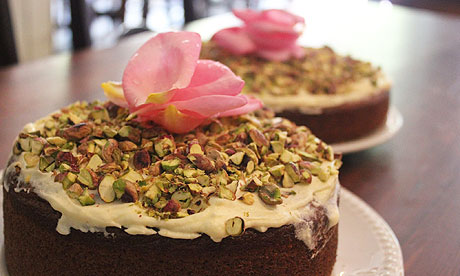
The campaigning activities of Peta (People for the Ethical Treatment of Animals) are designed to shock, with bucketloads of fake blood, semi-nudity and sexy vegetables. But have they gone too far this time? Quite a few cages were rattled when Peta announced last week that the best city for vegans in the UK is … Glasgow. Has Brighton really lost its crown?
Glasgow certainly has more vegan eateries than most cities, and its city-centre cafe bars give Brighton a run for its money. In the Merchant City area, Mono is an enormous airy performance space. The menu is light and modern, with vegan takes on popular international dishes – bean burritos, nasi goreng, Vietnamese salad and porcini risotto. Mono's sister, Stereo, a popular bar in the Mackintosh-designed building that was once home to the Daily Record, is always packed and also offers live music along with an all-vegan tapas-style menu.
The 78 cafe bar in the West End has a cosier vibe, with a coal fire, comfy sofas and a proper old HMV 78rpm record player. For a slightly less bohemian experience, head to Saramago café bar at the Centre for Contemporary Arts for freshly baked organic bread and some vegan haggis fritters.
Glasgow, with its history of radical politics, innovative live music and bar-based socialising, is a good fit with veganism. More generally, towns with large student populations and influential communities of academics are good places to look for vegan and vegetarian food. Old trading ports, too, have a history of diversity. Scouseveg, Liverpool's campaigning veggie social group, meets at The Egg Café on the roomy top floor of a Victorian warehouse. The menu is not particularly adventurous (quiches, soup and garlic bread), but the boho vibe is alive and kicking.
Bristol is home to the campaigning group Viva! and was the first venue for VegFest, originally an annual festival of veggie food and music. The city's Beatroot Café is a not-for-profit "community space" where all kinds of ethical campaign groups choose to meet over laptops and Fairtrade coffee. In Bath, an elegant vegetarian dining experience can be had at Demuths. Built around local produce, the menu might include truffled broccoli and cauliflower pannacotta.
Manchester's self-consciously "alternative" Northern Quarter is a good place to find a comforting plate of veggie sausage and mash, but for an exclusively vegan lunch, locals head to V-Revolution, a vegan shop/vinyl seller/zine outlet where you can grab a burger or a hefty wedge of cake. Manchester is proud of its vegetarian credentials. The Vegetarian Society started there in 1847, and the city now has two classy vegetarian bistros named 1847 in recognition of that fact. For a cheap and cheerful cafe lunch, head towards the university to find The Eighth Day, which has been serving up cheesy pasta bakes and salad since 1970, or try Earth, a busy vegan cafe beneath the Buddhist Centre, for wholesome, spicy stews.
Any city with a wide selection of ethnic eateries is likely to be a good bet for meat-free pickings – although Indian food is often laced with yoghurt and ghee, so vegans may favour the flavours of east Asia.
Manchester has the "Curry Mile" in Rusholme, with around 70 Asian restaurants. In London, Drummond Street is a safe bet. It is home to Chutneys, the Diwana Bhel Poori House and the Ravi Shankar, all longstanding vegetarian favourites.
Inevitably, London has more vegetarian and vegan establishments than anywhere else in the UK, with around 130 completely vegetarian restaurants. Relatively new developments include the Coach and Horses on Greek Street, Soho, which now serves exclusively vegetarian pub grub, and a new alcohol-free raw food experience called Redemption.
Brighton has been the most veggie-friendly town in Britain for decades, offering quirky little cafes such as Iydea and Wai Kika Moo Kau; civilised family-friendly dining at Food for Friends; funky vegan burgers at Heather Mills's VBites; and the town's most exciting restaurant, Terre a Terre, described by the food critic AA Gill as "probably the best vegetarian restaurant in Britain … singularly and eccentrically marvellous."
Other vegetarian destination restaurants include David Bann in Edinburgh (smoked tofu fritters with fresh banana chutney), and Denis Cotter's Café Paradiso in Cork – it is well worth a special trip to experience what he can do with local cheeses and Gortnanain honey.
Veganism and fine dining have yet to see eye to eye. A tiny minority of top-class chefs are grasping the nettle (and pureeing it), but most modern vegan food doesn't have fancy aspirations. It is more likely to be a burger or a hot dog, something you can grab on the go, not something that requires napkins and sitting up straight. Many tiny vegan eateries survive only through happy partnerships with other enterprises such as bars, performance spaces, art galleries and tattoo parlours.
And it's not all sweetness and light between vegans and vegetarians either – many vegetarian chefs don't exactly go out of their way to attract vegan customers. One (now defunct) restaurant in Cheshire told me that if vegans came to the door, they were advised to go elsewhere. Apparently, they were "bound to cause trouble". Another top vegetarian restaurateur says he doesn't like cooking for vegans: "They're people who don't like food. 'Can you make it without the cream?' I can, but I'm not going to!"
But the reputation vegans have for not enjoying food is all wrong. The best vegetarian food is about celebrating nature and trying to convince a sceptical world that a fresh, colourful platter of local fruit and veg is an ideal to which we should all aspire. For the most part, the world of veganism punctures that pomposity. These days it's largely about pop-ups, guerrilla caterers and street food entrepreneurs using the web to summon followers. It's OK if it comes out of a can, or even (for vegan freegans) out of a skip. It's OK to decorate a cake with Jammie Dodgers. Lighten up and dig in!

